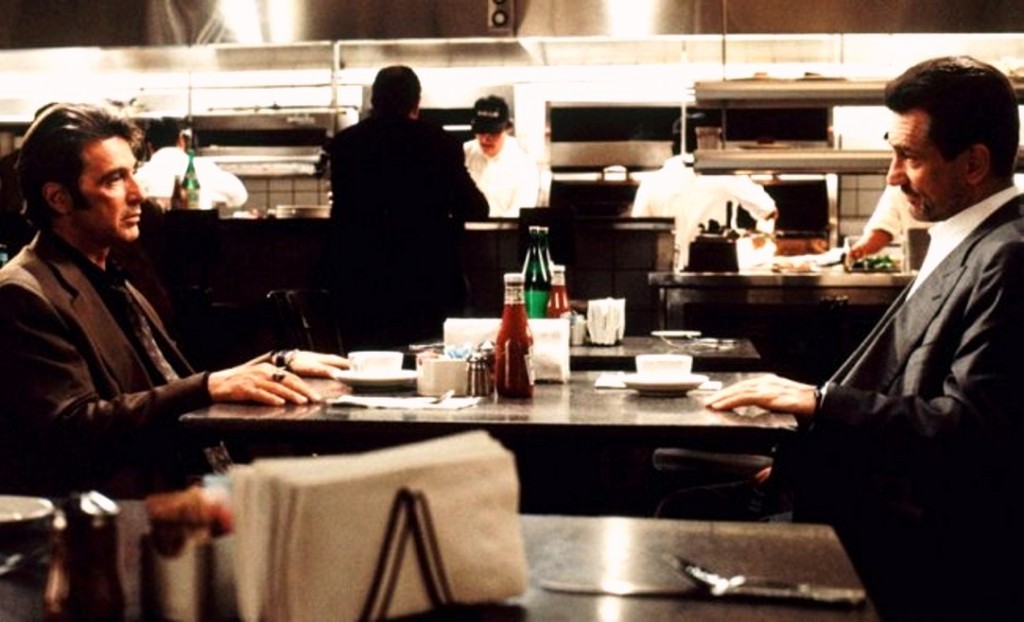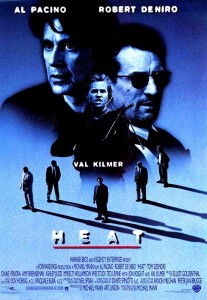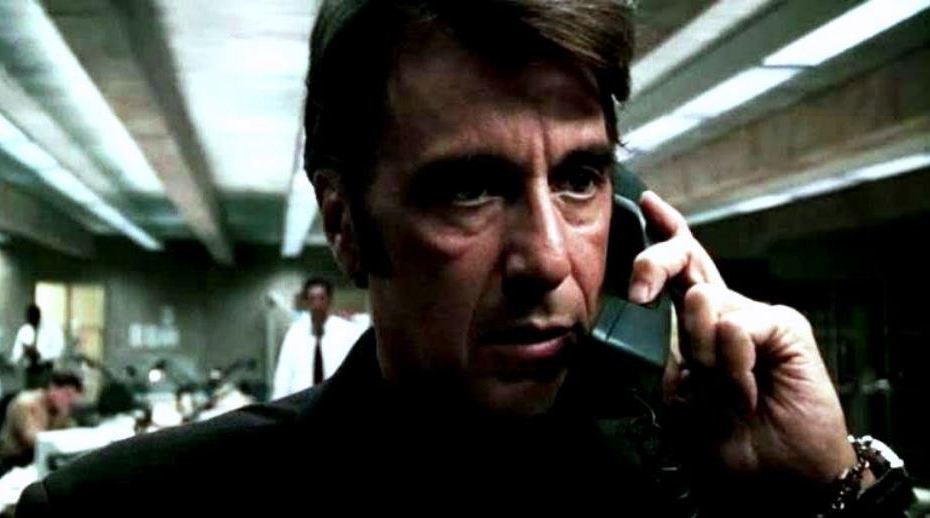
“Don’t let yourself get attached to anything you are not willing to walk out in 30 seconds flat if you feel the heat around the corner.”
Heat (1995) has Robert DeNiro and Al Pacino at the top of their game. DeNiro is the cool-headed sociopath who has never done “regular” things in life. Barbeques and ballgames, what the #$&% is that? Pacino, as an obsessed LAPD homicide detective, lives among the remains of dead people, his wife tells him. It’s his third marriage, will it be his last? Inundated criticism suggested that Pacino’s shouting was over-the-top, but it’s really one of his best performances. When Pacino’s shouting, he’s really acting out his daily addiction to rage and in being the showboat cop in his division. It’s all he really lives for. DeNiro and Pacino are opposite sides of the law, but they respect each other, because they understand they do what they do because that’s all they know how to do.
The current French film “Polisse,” concentrating on the Child Protection Unit department, is the best police film since “Heat” (although, take note, it’s less action-driven). When I reviewed this French masterpiece, I immediately had nostalgic flashbacks to December 1995, where I sat at the Century City Cineplex Odeon, the largest 70mm wide theater palace in Los Angeles. It helped that I had the perfect venue. But I knew then, instantaneously, that director Michael Mann (“Manhunter,” “Public Enemies”) made what I thought was the best cops-and-criminals film ever made. I still do think this, even more now.
Homicide Detective Vincent Hanna (Pacino) is the star of the police department. He measures his job success in terms of winning and losing. He does lament over the dead bodies that cross through his police work, but in his own imperturbable nothing-will-defeat-me way. But for the first time in all his years, he realizes he is losing his wife and stepdaughter because of his occupational commitment. Without saying so, he might believe he can cut down on his work hours – but only after the McCauley case is wrapped up. In exasperation, he decides to voice out his frustrations with his own adversary. Here comes the famous coffee shop scene when Pacino and DeNiro share the screen for the first time: Is Pacino trying to convince DeNiro to cut loose with all his gains and quit town?
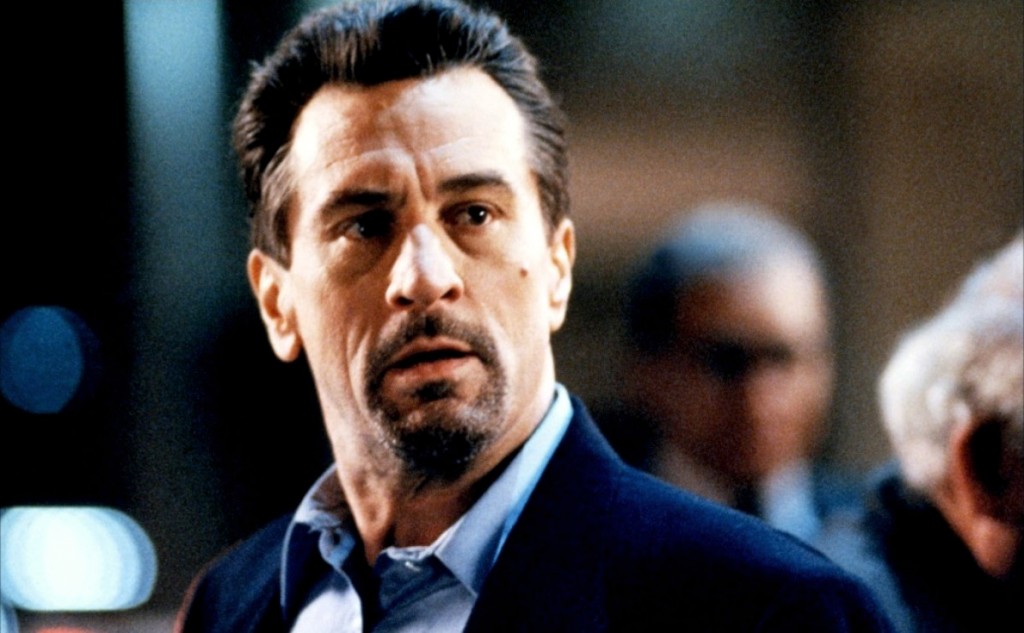 What I think now, that I never realized then, is just how deeply sad DeNiro’s character Neil MacCauley is. Including all his cronies, they’re all sad. They’re all underground operators, world-class thieves stealing big money. But in a way they use all their spare time maintaining low-profiles, filtering money, spending within budget, living on the fringe. The scene when the posse goes out for a fancy dinner is a transparent attempt in friends and family bonding. In reality, they would have to turn against each other if freedom depended on it. A couple of them like criminal colleagues Chris Shiherlis (Val Kilmer) and Michael Cheritto (Tom Sizemore) are family men, but they really don’t even have good parental influence over their young. Do these guys really know how to mold their children into in-line, conformed and law-abiding citizens when they grow up?
What I think now, that I never realized then, is just how deeply sad DeNiro’s character Neil MacCauley is. Including all his cronies, they’re all sad. They’re all underground operators, world-class thieves stealing big money. But in a way they use all their spare time maintaining low-profiles, filtering money, spending within budget, living on the fringe. The scene when the posse goes out for a fancy dinner is a transparent attempt in friends and family bonding. In reality, they would have to turn against each other if freedom depended on it. A couple of them like criminal colleagues Chris Shiherlis (Val Kilmer) and Michael Cheritto (Tom Sizemore) are family men, but they really don’t even have good parental influence over their young. Do these guys really know how to mold their children into in-line, conformed and law-abiding citizens when they grow up?
McCauley says he is willing to quit the business. He’s finally chosen a relationship with a meek bookstore worker named Eady (Amy Brenneman) as his would-be companion after retirement. But is it not true that he’s chosen Eady mostly because it’s out of convenience, and not because they’re both lost souls with similar needs for each other? Eady is soft-spoken, compliant and malleable – not likely a woman that would raise a finger at McCauley. But how about this: Before he rides off into the sunset, would McCauley be willing to walk-out on her in 30 seconds flat if he spotted the heat around the corner? I also don’t think McCauley needs anybody, for he’s too much of a loner sociopath to need any specific person to live with eternally.
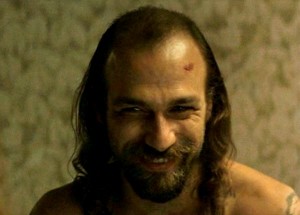 Equally complex are the subplots with money launderer Roger Van Zant (William Fichtner) and gun-for-hire/serial killer Waingro (Kevin Gage, pic right). Both these characters backstab the unyielding McCauley who never forgets to settle a score. Some of the shrewdest police work by Hanna in the film is to detain Waingro, and to release his whereabouts to a network of bail bondsmen, bookies and snitches in attempt to snare McCauley. Van Zant and Waingro align themselves together, sort of. Van Zant is the guy that McCauley stole from and tried to pay back, only to face an ambush team. Waingro is, well, a psychopath who deserves death. McCauley is strange and ruthless, icy and detached, pragmatic before acting on anything emotionally, but he does have his own self-appointed moral compass that he abides to instinctively. Revenge, within stealth requirements, is certain.
Equally complex are the subplots with money launderer Roger Van Zant (William Fichtner) and gun-for-hire/serial killer Waingro (Kevin Gage, pic right). Both these characters backstab the unyielding McCauley who never forgets to settle a score. Some of the shrewdest police work by Hanna in the film is to detain Waingro, and to release his whereabouts to a network of bail bondsmen, bookies and snitches in attempt to snare McCauley. Van Zant and Waingro align themselves together, sort of. Van Zant is the guy that McCauley stole from and tried to pay back, only to face an ambush team. Waingro is, well, a psychopath who deserves death. McCauley is strange and ruthless, icy and detached, pragmatic before acting on anything emotionally, but he does have his own self-appointed moral compass that he abides to instinctively. Revenge, within stealth requirements, is certain.
Dozens round out the cast, all of them compelling characters. Jon Voight as the shark and embezzler Nate, makes a living by setting up meetings between criminals and taking something off the top. Danny Trejo and Dennis Haysbert are criminals with a history of mortal jobs-for-hire getaway drivers – superbly lean storytelling establishes those characters in a matter of three scenes apiece.
Diane Venora is the would-be hot to trot wife, frustrated by husband Hanna who is always out on the beat. Natalie Portman, in her third substantial role following “The Professional” and “Beautiful Girls,” is the stepdaughter who needs a suicide watch (I respect Mann’s gifts as a storyteller by trusting his audience to fill in the gaps). Ted Levine, Mykelti Williamson and Wes Studi are among the co-detectives who are well-seasoned but contentedly satisfied with their second banana roles in the department.
Also worth mentioning are Ashley Judd, Hank Azaria, Tom Noonan, Henry Rollins, Jeremy Piven and Xander Berkeley.
 Famous is the cataclysmic street battle at the two hour mark, which begins as organized tag team shooting and then turns into a bloodbath battle royale, and is among the two or three best shootouts ever (“Scarface” and “The Matrix” deserve a share at the top prize in this category). But what has always humbled, if amazed me, is that “Heat” goes on with another hour of gripping drama, more surprises, and a final more intimate showdown, that is as rousing as it is emotionally affective.
Famous is the cataclysmic street battle at the two hour mark, which begins as organized tag team shooting and then turns into a bloodbath battle royale, and is among the two or three best shootouts ever (“Scarface” and “The Matrix” deserve a share at the top prize in this category). But what has always humbled, if amazed me, is that “Heat” goes on with another hour of gripping drama, more surprises, and a final more intimate showdown, that is as rousing as it is emotionally affective.
172 Minutes. Rated R.
Film Cousins: “Le Cercle Rouge” (1970, France); “Serpico” (1973); “Manhunter” (1986); “GoodFellas” (1990); “Donnie Brasco” (1997).
